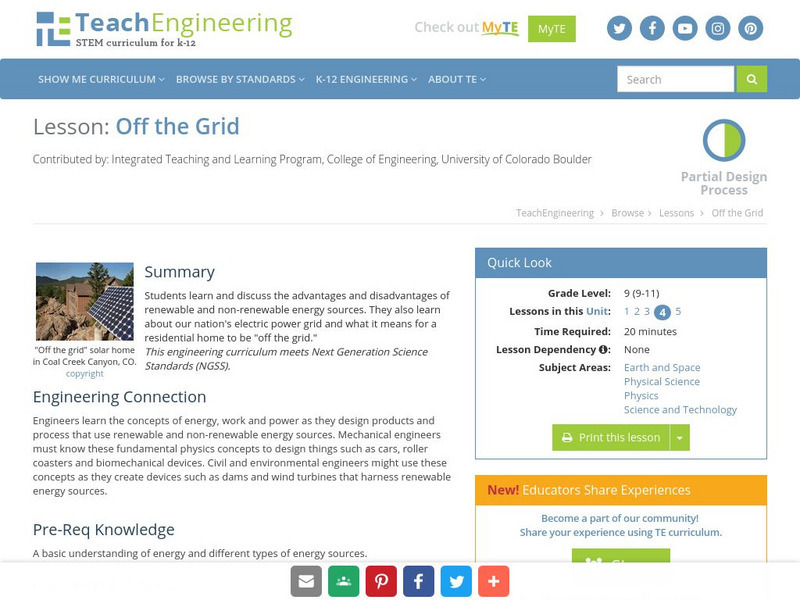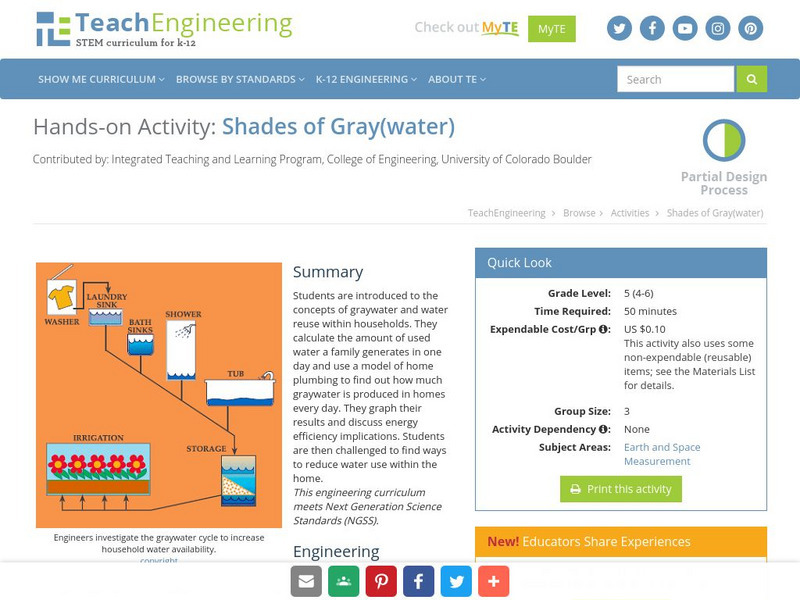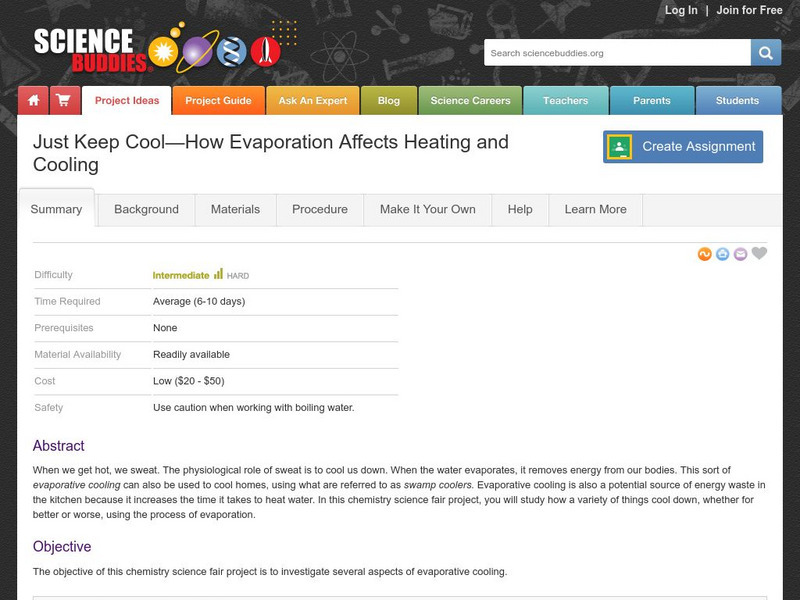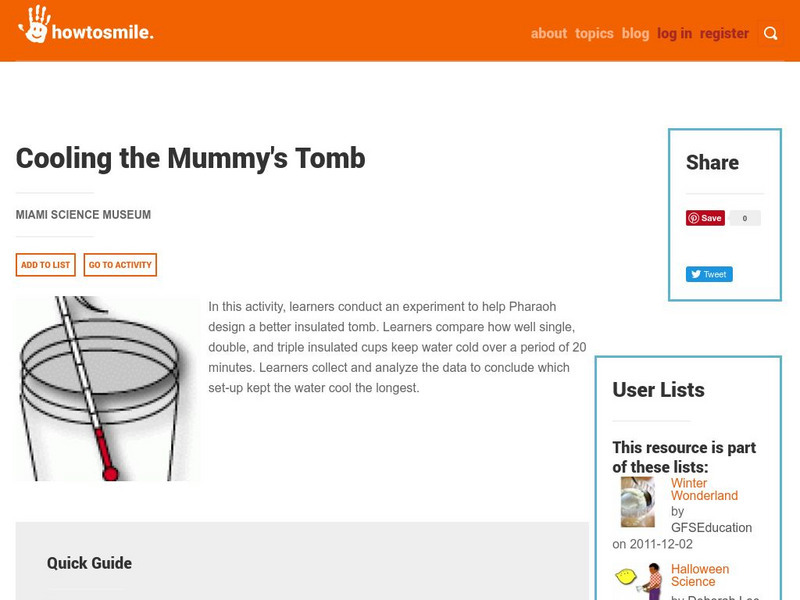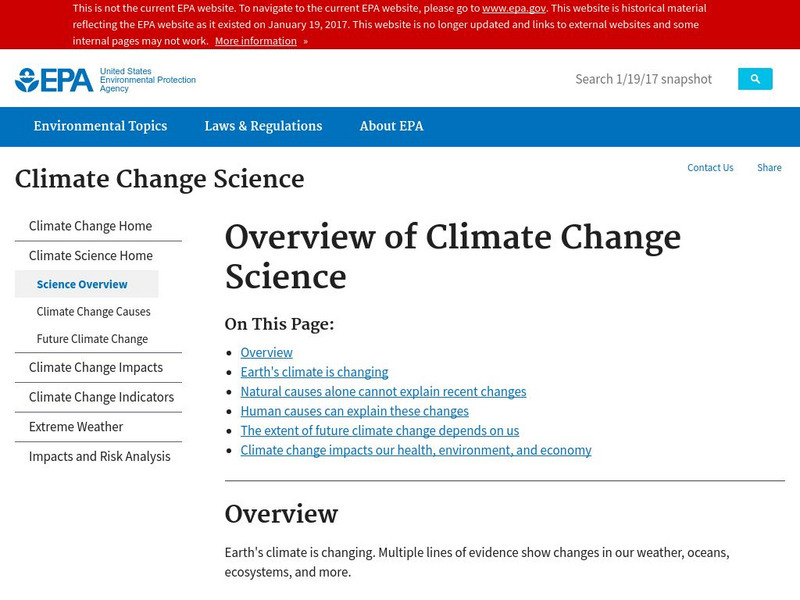Other
Conservation Corps Newfoundland and Labrador: Climate Change Club
Join the fun at the Climate Change Club where you can find out ways to take action at home, in school, and in your community. Keep up with the latest news in climate science, and link to fact sheets and other fun sites that care about...
TeachEngineering
Teach Engineering: Homes for Different Climates
Students learn about some of the different climate zones in China and consider what would be appropriate design, construction and materials for houses in those areas. This prepares them to conduct the associated activity(ies) in which...
Environduck
Enviroduck: A Greener Home Save Resources Like Water and Energy
Go green at home by saving energy, water, food. Learn how to conserve.
University Corporation for Atmospheric Research
Ucar: Energy Balance & Greenhouse Effect Teaching Box
This teaching box will help your students understand how conservation of energy determines the average temperature of a planet, including Earth. These activities also illustrate how the greenhouse effect prevents our home planet from...
Other
Abc Da Energia
ABC Da Energia describes the many ways that energy can be obtained and conserved. It explains different sources of energy, how each works, and how energy can be saved in our daily lives. Interactive energy-saving activities and games...
Other
Warmair.com: Attic Insulation Calculator
An online JavaScript application which allows visitors to investigate the relative amount of heat being lost from their homes due to insufficient insulation. The current R-value and a hypothetical R-value can be entered and the energy...
TeachEngineering
Teach Engineering: Off the Grid
Students learn and discuss the advantages and disadvantages of renewable and non-renewable energy sources. They also learn about our nation's electric power grid and what it means for a residential home to be "off the grid."
PBS
Pbs Teachers: Exploring Alternative Energy Sources
Calculate the increased cost of heating homes and fueling cars since the energy crisis. Investigate alternative renewable and nonrenewable energy sources that can be used to decrease Americans' dependency on fossil fuels.
Other
We Calc: Your Home Water Water Energy Climate Calculator
Through a thorough survey examining your home water habits to estimate your water use as well as connect the water energy use in your home to the emission of greenhouse gas.
Other
The Green Guide
The Green Guide offers environmental advice with regard to home and garden, travel and transportation, and food. For example, find ways that you can make over your living room, or add home insulation, or buy a television the green way.
Climate Literacy
Clean: Compact Fluorescent Light Bulbs Cost Benefit Analysis
This analysis activity allows students to calculate electrical usage in home lighting, and create a cost-benefit analysis for cost and energy savings by replacement of incandescent light bulbs with compact fluorescent or LED light bulbs.
Environduck
Enviroduck: Greener Home Saving Energy With Hvac and Hot Water
Conserve energy at home with these hvac, heating and air conditioning, and hot water tips.
Environduck
Enviroduck: Greener Home Saving Energy With Your New Hdtv Television
Conserve energy with Plasma, LCD, HDTV television sets at home. TV saving tips.
Environduck
Enviroduck: Greener Home Saving Energy With Cfl Lighting and Bulbs
Conserve energy at home with Compact Fluorescent Lamps or CFL light bulbs.
TeachEngineering
Teach Engineering: Shades of Gray(water)
Students are introduced to the concepts of graywater and water reuse within households. They calculate the amount of used water a family generates in one day and use a model of home plumbing to find out how much graywater is produced in...
Science Buddies
Science Buddies: Spare a Watt, Save a Lot
In this science fair project, you will investigate the different uses of electricity in your home. By identifying appliances, and determining how much energy they use, as well as which are phantom loaders, you can determine if there are...
Science Buddies
Science Buddies: Just Keep Cool How Evaporation Affects Heating and Cooling
When we get hot, we sweat. The physiological role of sweat is to cool us down. When the water evaporates, it removes energy from our bodies. This sort of evaporative cooling can also be used to cool homes, using what are referred to as...
Other
Carbon Footprint: Co2 Reduction: Around Your Home
Learn how to reduce your carbon footprint around your home by reducing your energy usage and heat loss.
Other
North Carolina Department of Energy and Natural Resources: Dirt Can Be Dirty
Did you know that the #1 pollutant in North Carolina is dirt? When soil is washed into streams and river, it smothers small animals and fish by clogging their gills. Look for bare patches of ground around your home and around your school...
Other
The Atom's Family: Cooling the Mummy's Tomb
Help the Pharaoh design a better tomb by investigating insulation materials.
US Environmental Protection Agency
Epa: Climate Change
Comprehensive site on climate change includes basic information on greenhouse gas emissions, health and environmental effects, regulatory initiatives and what people can do at home, on the road, at the office and at school to reduce...
NASA
Nasa: Climate Kids: Tiny House Fun
Step inside the newest, most environmentally friendly home. This tiny house is not only becoming a hot trend, it is also a budget friendly housing option, too.
Other
Warmair.com: Insulation
The role of insulation in preventing heat loss is discussed. The concept of thermal resistance is introduced and explained. Understandable language but no graphics.
Other
Get Wise
Interactive site allows users to click on various places in a home and see how energy can be conserved there.







